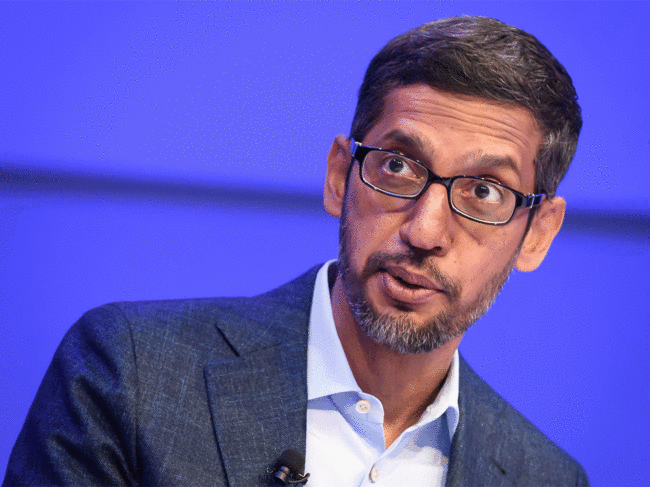 PTI
PTIDAVOS: Google chief Sundar Pichai on Wednesday said the world needs a free and open internet for everyone and hoped that all countries will come together for a common regulatory framework for artificial intelligence (AI).
Speaking here at WEF 2020, Pichai also said privacy cannot be a luxury good and it has to be safeguarded for everyone.
"Internet is actually an export product. Even in India, if we talk about YouTube, a video created by an Indian gets audience from across the world. That's the beauty of digital economy" he said.
Pichai, also CEO of Alphabet, said he has always been a technology optimist, having experienced firsthand the benefits new technology brought to his own life.
"Growing up, I had to wait for either a telephone or a television and each time these things came to my home I realised what an important role technology plays in our lives. More recently, we have seen how AI can play a great role, including for doctors and weather forecasts," he said.

Pichai added he is clear-eyed about the risks of technology, but the risk of AI is failing to work on it, because it can affect billions of people.
On quantum computing, he said this is a major milestone because quantum computers can do a lot many things that the classical computers cannot.
"With this, we can simulate nature better and we can better predict weather and climate change. They can make better batteries. It's very profound," he said.
"When I look at future, quantum will be the next big arsenal in the way of technology. We will need to work a lot. The combination of AI and quantum computing would be amazing. Also, quantum's combination with biology would present huge potential, but obviously we will have to be very careful," Pichai added.
Addressing the challenges of regulating AI, he said: "AI is no different from climate - you can't get safety by just one company or country working on it - you need a global framework."
Pichai said he is optimistic that all countries will cooperate in such a framework.
"I think there will be common gravitational pull - regardless of who you are, because people will recognise the need of such a framework for the sake of peace and prosperity," he said.
Speaking here at WEF 2020, Pichai also said privacy cannot be a luxury good and it has to be safeguarded for everyone.
"We need a free and open internet for all, while data sovereignty is important for every country and that needs to be taken into account in any data protection framework in any part of the world.
"Internet is actually an export product. Even in India, if we talk about YouTube, a video created by an Indian gets audience from across the world. That's the beauty of digital economy" he said.
Pichai, also CEO of Alphabet, said he has always been a technology optimist, having experienced firsthand the benefits new technology brought to his own life.
"Growing up, I had to wait for either a telephone or a television and each time these things came to my home I realised what an important role technology plays in our lives. More recently, we have seen how AI can play a great role, including for doctors and weather forecasts," he said.
Discover the stories of your interest

Pichai added he is clear-eyed about the risks of technology, but the risk of AI is failing to work on it, because it can affect billions of people.
On quantum computing, he said this is a major milestone because quantum computers can do a lot many things that the classical computers cannot.
"With this, we can simulate nature better and we can better predict weather and climate change. They can make better batteries. It's very profound," he said.
"When I look at future, quantum will be the next big arsenal in the way of technology. We will need to work a lot. The combination of AI and quantum computing would be amazing. Also, quantum's combination with biology would present huge potential, but obviously we will have to be very careful," Pichai added.
Addressing the challenges of regulating AI, he said: "AI is no different from climate - you can't get safety by just one company or country working on it - you need a global framework."
Pichai said he is optimistic that all countries will cooperate in such a framework.
"I think there will be common gravitational pull - regardless of who you are, because people will recognise the need of such a framework for the sake of peace and prosperity," he said.












